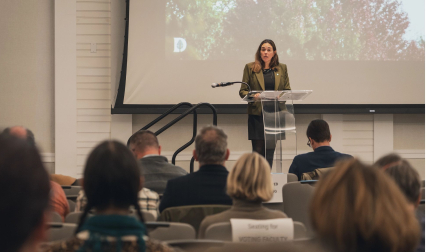Howe has worked in book conservation for more than 35 years—16 of them with the College’s collection management and preservation department, which she oversees today. She repairs books from circulation, makes book cradles for rare materials at Rauner Special Collections Library, and leads classes in the Book Arts Workshop. Among her feats: She rebound Rauner’s 1450 copy of the Brut Chronicle—a medieval history of Britain—to make it functional for student use. She recreated a class of 1907 alumni scrapbook so it no longer is on acidic pages. After catastrophic flooding last summer, Howe and Dartmouth’s Collections Action and Response Team helped recover the Strafford Historical Society’s 17th-century books and documents that were damaged in nearby Vermont. Here, Howe discusses best practices for preserving your own collection.
Location Matters
Books are kind of like people—they want to be comfortable in their environment. Basements tend to flood and generally get damp, so you’re going to get mold outbreaks. At least keep your books off the floor. Attics can get very cold in the winter and very hot in the summer. The same goes for garages. These extreme temperature and humidity fluctuations are bad for your collection. You want your books out of the sunlight, in a climate-controlled space, and perhaps in a space with airflow. Some examples are your living room, bedroom, or office. Most of my collection is in my living room, but I admit I have some items in the basement on shelving.
Cardboard vs. Plastic
People often ask if you should use plastic or cardboard boxes for storage. If you put materials in a plastic tub and seal it up, and moisture gets in there, that’s just asking for mold to happen. A cardboard box can breathe. It’s not completely sealed up, so you’ve got airflow. But if that box gets wet, you’re in a worse state than with the plastic. Right now, I use cardboard. You have to pick your battles. Pack books with spines down or like you would on a bookshelf but never fore edge down. Pack tightly to avoid slump.
When All Else Fails
Getting your valuable collections out of areas that could be affected by climate change—more rain, flooding, and moisture—is becoming more important. If things get wet, the first thing you want to do is dry them out. Mold sets in at 72 hours. Spread out your documents and turn on some fans. Things might get a little cockled, but better that than mold. Once things start to dry, stack pages and interweave them with paper towels, changing them out until things are dry. The Northeast Document Conservation Center (in Andover, Massachusetts) is a great nonprofit resource for conservation needs. Prices are high—$200 for a service proposal and $1,000 minimum for conservation treatment—so that’s only for more important personal items such as a family Bible, etchings from a famous artist, or valuable prints. Its website is also a great online information resource.
The Deal with Digitizing
Today you can look at a manuscript in the British Library without actually going there. But getting information online isn’t the same as in person with the physical object. It doesn’t capture the three-dimensional presence. Without the physical item you lose the sentimentality of personal items. Still, it’s smart to back up personal papers. Digitizing is about duplication.




